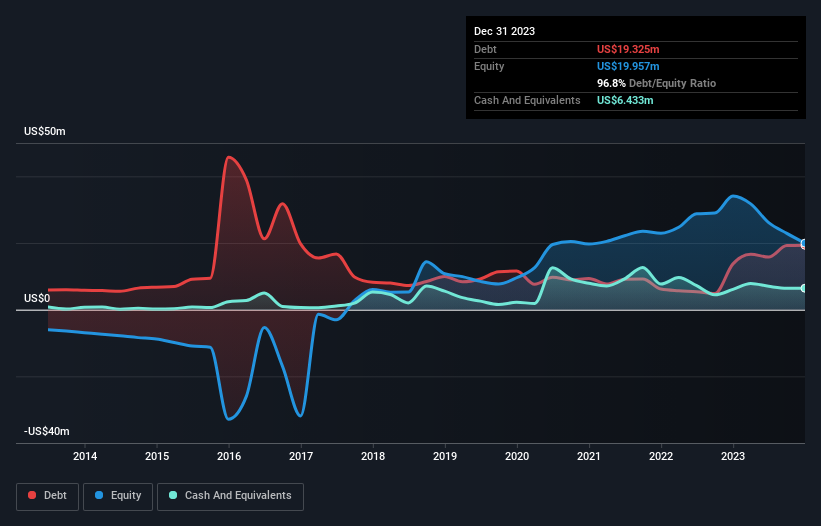- United States
- /
- Entertainment
- /
- NasdaqCM:DLPN
Is Dolphin Entertainment (NASDAQ:DLPN) Using Too Much Debt?
The external fund manager backed by Berkshire Hathaway's Charlie Munger, Li Lu, makes no bones about it when he says 'The biggest investment risk is not the volatility of prices, but whether you will suffer a permanent loss of capital.' So it seems the smart money knows that debt - which is usually involved in bankruptcies - is a very important factor, when you assess how risky a company is. As with many other companies Dolphin Entertainment, Inc. (NASDAQ:DLPN) makes use of debt. But is this debt a concern to shareholders?
When Is Debt A Problem?
Generally speaking, debt only becomes a real problem when a company can't easily pay it off, either by raising capital or with its own cash flow. Part and parcel of capitalism is the process of 'creative destruction' where failed businesses are mercilessly liquidated by their bankers. However, a more frequent (but still costly) occurrence is where a company must issue shares at bargain-basement prices, permanently diluting shareholders, just to shore up its balance sheet. Of course, plenty of companies use debt to fund growth, without any negative consequences. The first thing to do when considering how much debt a business uses is to look at its cash and debt together.
See our latest analysis for Dolphin Entertainment
What Is Dolphin Entertainment's Debt?
You can click the graphic below for the historical numbers, but it shows that as of December 2023 Dolphin Entertainment had US$19.3m of debt, an increase on US$13.7m, over one year. However, it does have US$6.43m in cash offsetting this, leading to net debt of about US$12.9m.

How Strong Is Dolphin Entertainment's Balance Sheet?
We can see from the most recent balance sheet that Dolphin Entertainment had liabilities of US$27.5m falling due within a year, and liabilities of US$18.8m due beyond that. Offsetting this, it had US$6.43m in cash and US$12.5m in receivables that were due within 12 months. So its liabilities total US$27.4m more than the combination of its cash and short-term receivables.
Given this deficit is actually higher than the company's market capitalization of US$20.5m, we think shareholders really should watch Dolphin Entertainment's debt levels, like a parent watching their child ride a bike for the first time. Hypothetically, extremely heavy dilution would be required if the company were forced to pay down its liabilities by raising capital at the current share price. There's no doubt that we learn most about debt from the balance sheet. But it is future earnings, more than anything, that will determine Dolphin Entertainment's ability to maintain a healthy balance sheet going forward. So if you're focused on the future you can check out this free report showing analyst profit forecasts.
In the last year Dolphin Entertainment wasn't profitable at an EBIT level, but managed to grow its revenue by 6.5%, to US$43m. That rate of growth is a bit slow for our taste, but it takes all types to make a world.
Caveat Emptor
Importantly, Dolphin Entertainment had an earnings before interest and tax (EBIT) loss over the last year. Its EBIT loss was a whopping US$6.0m. Considering that alongside the liabilities mentioned above make us nervous about the company. It would need to improve its operations quickly for us to be interested in it. Not least because it burned through US$4.6m in negative free cash flow over the last year. So suffice it to say we consider the stock to be risky. When analysing debt levels, the balance sheet is the obvious place to start. But ultimately, every company can contain risks that exist outside of the balance sheet. For example, we've discovered 2 warning signs for Dolphin Entertainment that you should be aware of before investing here.
When all is said and done, sometimes its easier to focus on companies that don't even need debt. Readers can access a list of growth stocks with zero net debt 100% free, right now.
New: Manage All Your Stock Portfolios in One Place
We've created the ultimate portfolio companion for stock investors, and it's free.
• Connect an unlimited number of Portfolios and see your total in one currency
• Be alerted to new Warning Signs or Risks via email or mobile
• Track the Fair Value of your stocks
Have feedback on this article? Concerned about the content? Get in touch with us directly. Alternatively, email editorial-team (at) simplywallst.com.
This article by Simply Wall St is general in nature. We provide commentary based on historical data and analyst forecasts only using an unbiased methodology and our articles are not intended to be financial advice. It does not constitute a recommendation to buy or sell any stock, and does not take account of your objectives, or your financial situation. We aim to bring you long-term focused analysis driven by fundamental data. Note that our analysis may not factor in the latest price-sensitive company announcements or qualitative material. Simply Wall St has no position in any stocks mentioned.
About NasdaqCM:DLPN
Dolphin Entertainment
Operates as an entertainment marketing and production company in the United States.
Fair value with mediocre balance sheet.
Similar Companies
Market Insights
Community Narratives



